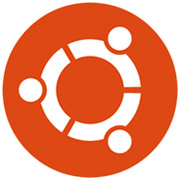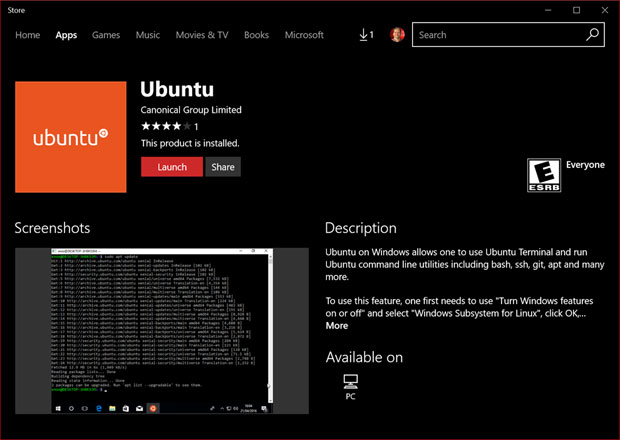
Microsoft this week announced the availability of Canonical’s Ubuntu Linux distro as a free download in the Windows Store.
It can be installed on any Windows Insider build, said Microsoft Senior Program Manager Rich Turner.
There are some distinct advantages to using the Windows Store version of the Ubuntu Linux Distro:
- The software can be downloaded faster and more reliably due to the use of a sophisticated block-based download mechanism; and
- The store version has been enhanced to support running multiple distros side-by-side and simultaneously, which will be especially handy when Fedora and Suse get the Store treatment in the next few weeks.
The Windows Store version of Ubuntu will run alongside any other existing distros of the operating system on a machine, Turner noted.
The Store version of the OS can be launched from a tile on the Windows start menu or from a command line, he added.
Benefits Open Source Community
Offering Ubuntu through the Windows Store makes the software more discoverable by users, which could have an impact on its popularity.
“By putting Ubuntu immediately available on the Windows desktop, we’re bringing Ubuntu, Linux and open source to billions of Windows users in the world,” said Dustin Kirkland, head of product and strategy for Ubuntu at Canonical.
“We’re super proud of that,” he told LinuxInsider.
It seems unlikely, though, that rank-and-file Windows desktop users will start downloading and installing Ubuntu from the Windows Store.
“This is a developer play — this isn’t for the average consumer,” said Al Gillen, an analyst with IDC.
“If you don’t handle this right, you could cause some significant problems to your system,” he told LinuxInsider. “It’s about empowering developers to develop in a more convenient manner.”
Boon for Developers
Windows Store Ubuntu could be a very attractive offering for some developers.
“This could be a dream come true for a developer trapped in Windows,” Canonical’s Kirkland said.
Developers who are working on open source projects but want Windows as their desktop operating system will be able to keep using it, while working with their Linux tools through Ubuntu.
“It will make it easier for Linux and open source developers to have access to Microsoft application software like Office, and server software like Exchange and SQL Server, and still be able to develop applications with their familiar Linux tools,” observed Michael Cherry, a Windows analyst at Directions on Microsoft.
In addition, it gives them access to Windows applications, Windows command line, PowerShell and Linux user mode tools, without having to run Linux virtual machines on Windows.
It also allows Windows developers who use Visual Studio tools, but are developing for other platforms or for hosted services, to have access to Linux tools, Cherry told LinuxInsider.
Developers aren’t the only ones who may benefit from Windows Store Ubuntu, however.
“It may prove useful for administrators who have to manage both Linux and Windows servers,” Cherry said.
Making Developers Happy
With Windows Store Ubuntu, developers who don’t want to trade Windows desktop productivity for Linux coding tools don’t have to.
“They can have their cake and eat it, too,” remarked Rob Enderle, principal analyst at the Enderle Group.
“The goal here is to remove one of the reasons for abandoning Windows and moving to a pure Linux load,” he told LinuxInsider.
Microsoft clearly wants to get on the good side of developers with its Linux Windows Store strategy.
“This is a play on Microsoft’s part to support the developer community and give them the tools they need to do their jobs,” IDC’s Gillen said.
“It recognizes that developers want to have multiple platforms accessible to them,” he pointed out.
“It’s also part of Microsoft’s outreach to developers,” added Directions on Microsoft’s Cherry, “particularly those who might have been less willing to develop applications and services which run on Azure if they had to abandon their tools and processes for development.”
Developers have been migrating from Windows as a development platform to Linux or macOS for years, Canonical’s Kirkland said.
“What Microsoft is doing here,” he explained, “is making sure Linux tools are available from the Windows desktop so they can attract developers back to it.”





















































